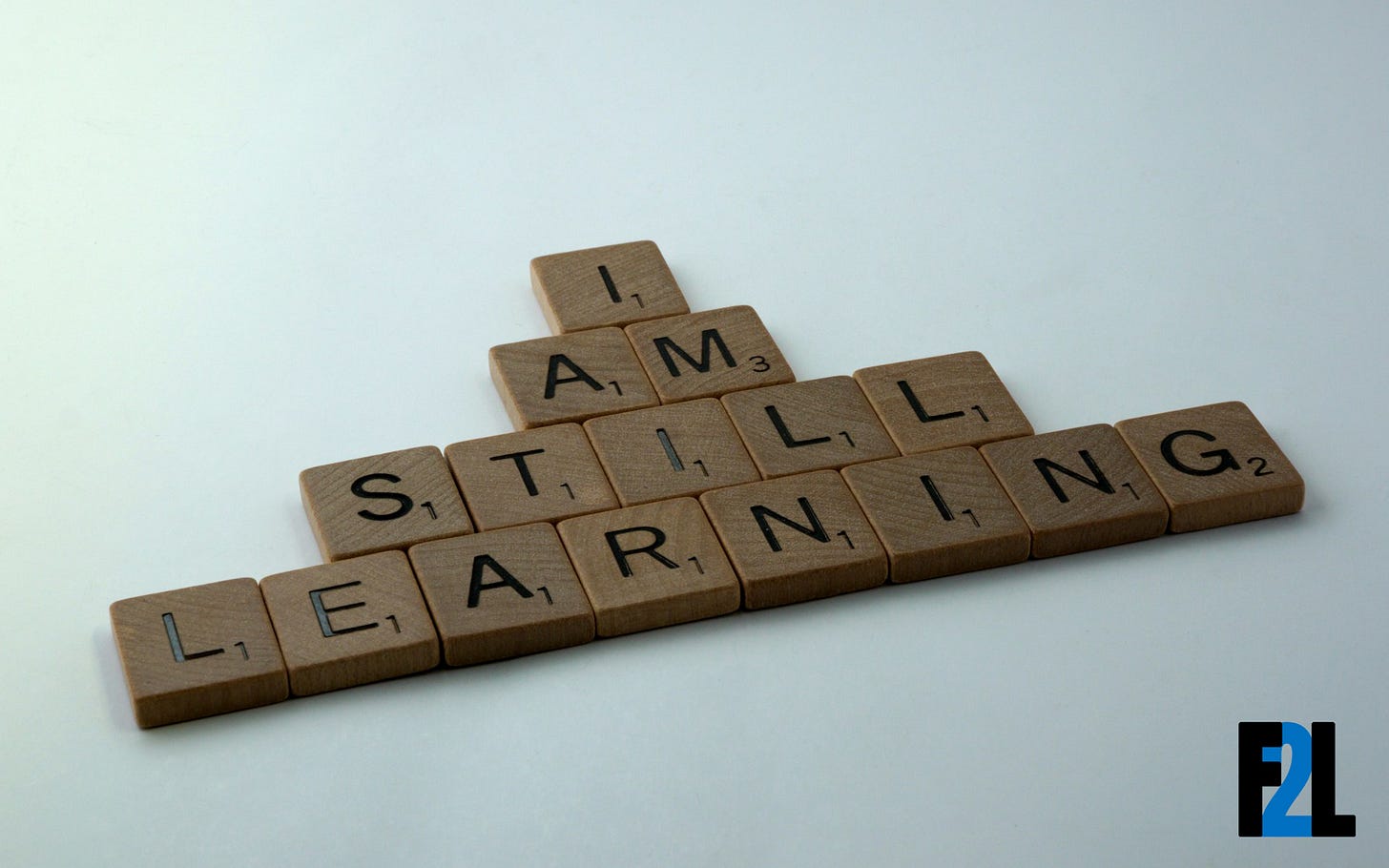Are You (Really) a Learner?
Unchurching and Actionalizing Our Relationship to God

In This Article:
7 questions that unlock the practicality of being a disciple.
Discover how having a “learner” identity can increase your leadership influence.
Key Application:
5-minute daily discipline to drive a “learner” identity
What Does “Disciple” Mean to You?
In my experience, “disciple” is NOT a term that most U.S. Christians would use to refer to themselves. Most of the time, “disciple” refers to “discipleship”—which typically means an educational program at church that (it is hoped) will result in higher levels of spiritual maturity.
Historically, this discipleship process mirrors the preparation for pastoral leadership that leverages a formal higher education. While education is valuable (duh), this emphasis comes with some realities:
It takes years to complete.
It’s built on Western classroom-based methodologies.
It has a perceived beginning and ending.
It highly esteems knowledge acquisition.
It’s impact is limited primarily to those participating in it.
Being a disciple becomes something we know, not something we are; something we learn, not something we practice. It’s also dramatically different from Jesus’s methodology, that was built on experiential field work.
To illustrate what I mean, think of the typical discipleship process in a business context … Imagine yourself as the CEO of a company, and someone proposes a leadership development and employee engagement process that …
Takes 6 years to complete,
Requires time away from work to focus on classroom training, and
Would produce more knowledgeable employees who could critique the philosophy of your company and its industry, but who weren’t necessarily any more capable at executing in their roles to improve your company’s product or service.
Would you stake the future of your company on such a process? Not likely. There’s a different way to think about “disciple”—one that has immediate impact on how you see yourself, and how others see you.
“Disciple” As an Identity
Disciple is the term that defined all of Jesus’ followers. It literally means “a learner”: someone who chose a rabbi they wanted to be identified with, adopting their rabbi’s way of life, principles, values and teaching.
Today, living as disciples of Jesus can (should?) be the identity and life practice for every believer. Being a “learner” of Jesus (i.e. our identity instead of our education) opens up so many more possibilities to help others be learners as well. Nearly all aspects of human interaction are available for use in making disciples. We can lead others to be disciples in any life stage, in any vocation or relational situation; anywhere, anytime. It’s not a church educational program, it’s a way of life.
Being a learner is something we are; something we live out. Our knowledge is built on deep understanding gained through experience and the exercise of faith, instead of cognitive facts and philosophy.
Returning to the previous illustration where you are the CEO, if someone proposed a program where …
Every individual has a mentoring sponsor investing time with them, training them and allowing them to practice and develop as they perform in their roles.
Each employee would be given the opportunity to shape their job execution according to their gifts, talents and experience.
Every employee would also be expected to contribute toward investing what they know in another employee.
Collaboration and organizational learning would flow upstream and downstream, not only to maximize individual employee impact but also to strengthen the whole employee community.
What CEO would resist such an approach? 1
In its simplest terms, a disciple is someone who …
Hears God,
Responds in obedience, and
Shares that experience with others.
”Being a learner is something we are; it’s something we live out.”
Seeing ourselves as learners means believing that God is always at work, using every believer to expand his kingdom and draw people to himself. We can recognize how he’s working and how he will direct us (“hear”), and be ready to follow his leading (“responding in obedience”). Investing time with the people he brings to us (“share”) is natural and aligns with the Holy Spirit’s guidance. Believers experience individual, personal, apprentice-style training. The focus on making another disciple using a train-the-trainer approach bakes in multiplicative reproduction as a product.
Simple, Not Necessarily Easy
Seeing ourselves as learners is straightforward, but not necessarily easy. Everything in our world drives us to see ourselves as “knowers.” After all, knowers get esteemed, quoted and liked. We like the certainty, confidence and assurance that come with knowing. Being a knower is built upon a foundation of pride.
Being a learner is built on humility. Even Jesus—as God incarnate—admitted there were things he didn’t know. His human knowledge was limited by the container it functioned in: his brain. He had to learn in the same way you and I do. He “grew in wisdom and stature” (Luke 2.52), using the same approach available to you and me: hearing, responding in obedience and sharing with others. “Very truly I tell you,” Jesus said, “the Son can do nothing by himself; he can do only what he sees his Father doing, because whatever the Father does the Son also does” (John 5.19).
Being a learner never concerned him or minimized his impact as the most influential human that ever walked the planet. His confidence came from his belief that the Father knew, and that was good enough for him.
Following (i.e. being a learner of) Jesus means adopting the same approach, and helping others to do the same.
7 Questions
So what does being a learner have to do with leading others? In whatever role(s) you have influence (business leader, church leader, parent, friend), I invite you to reflect on these questions …
If you’re not seeking to be like Jesus, who are you seeking to be like … and why?
What are the areas you’re choosing NOT to be a learner, and why?
Remember: Being a learner helps prepare you for future leadership opportunities, that are usually more complex, more challenging and go beyond what you currently know.How much will the people you lead strive to be learners when they see that you aren’t pursuing it?
How comfortable are you with other leaders on your team who are unwilling to be learners, yet consistently expect more opportunity or increased benefits?
How would you feel if the people you lead were focused on themselves and their agendas, instead of the organization’s?
In contrast, how would you feel if the people you lead saw equipping and training others as their overarching purpose of their roles?
How does your perspective to these questions change when you realize that you are one of the people in Jesus’ organization?
What Next?
Assuming those 7 questions exposed some ways that you’re seeing yourself as a knower instead of a learner, it’s now clear where to begin in the identity change process. Our natural tendency at this point is to increase our learner behaviors (more prayer, Bible study, etc.). But moving straight to action without establishing identity clarity is not only fraught with failure (does the phrase “New Year’s resolution” sound familiar?), it’s actually backwards from the way God designed our brains to function.
I’ll be writing a number of future articles to unpack this, but for now I’ll summarize by saying identity drives behavior: What and how we think determines what we do. The healthy approach is to start with getting absolute clarity on who you are and who you want to be. This can then be followed by exploring what it looks like to live according to that identity.
I recommend starting with the most under-utilized leadership and faith discipline in the Western world: the practice of reflection.2 Daily reflection may sound like fortune-cookie psychology, but it’s actually great brain stewardship.
The steps of reflection are pretty simple:
Reflect on your identity for 5-15 minutes each day for 30 days.
Set aside a time where you’ll be uninterrupted and undistracted.3
Begin with a focused identity truth: You are a learner/follower of Jesus, highly valued and loved by God (irrespective of your performance).
Let your mind wander as you ponder this truth, and take notice of what other thoughts this generates.
Capture your thoughts.4
You’ll probably become conscious of a range of thoughts: Some positive and supportive of a learner identity, some with a negative tone (accusation, failure, frustration, fear, etc.). If your thoughts seem random, look for common patterns or themes that might be present.
At the end of your reflection time, summarize the 1-3 most prominent and prevalent thoughts or thought patterns.
Intentionally recognize, reaffirm and celebrate the positive ones.
Actively target the negative ones for change. This might feel daunting based on the thought, but that’s okay … just keep pressing forward.
Determine one simple step of application.
You might be tempted to do more, but it’s important that you act on one step at a time.
Pray, and ask the Lord three things: 1) What do I need to understand? 2) What do you want me to do? 3) Who do I need to talk to?
Take action on whatever he reveals to you, in whatever way is natural for you. Journal, set a goal (make sure it’s achievable and measurable), tell a friend for support and encouragement, etc.
Don’t overreach on this. You’re daily, steady progress of change will be foundational and long-lasting.
“Reflection is the most under-utilized leadership discipline in the Western world.”
Start small, and don’t stop (think on the order of 30 days, minimum). It’s more important to take small daily steps than to try to finish the whole process in a week; big and grandiose goals virtually guarantee failure.
Let this new identity become infused into everything you do, as a way of life. Think of it as yeast in dough: Let it do its work over time.
Peace be with you!
Looking for More Leadership Insights?
Check out my book Taking the Lead: What Riding a Bike Can Teach You About Leadership
This approach is why Business as a Ministry (BAM) has come into wide acceptance as a valid expression of the Church. Christian-operated businesses have a ministry opportunity to build disciple-making into the fabric of their operations, and it becomes an organic and effective way to make disciples.
Contemporary leadership emphasizes decisive action, and rightly so. But unfortunately this can cast a negative light on the discipline of reflection, making it appear as unnecessary introspection that doesn’t produce or perform. This attitude is actually very dangerous, and positions leaders for massive failure. Only through strategic reflection do we get beyond the limits of what we know in our own thinking to get a glimpse of “the bigger picture.” Consider biblical examples of people we typically consider “high achievers” (ex: David or the apostle Paul). What was the source of their insight and convictions, if not from the discipline of reflection and having their minds reshaped by God’s Spirit? For a David to write “I meditate on your law day and night” is not hyperbole, it is a statement of fact.
Consider doing this at the end of the day (instead of in the morning). 1) It helps to process on the events of the day while they are still fresh in your mind. 2) It will bring a clarity and closure to thoughts that your brain is likely chewing on subconsciously. Without reflection these thoughts will continue to churn in your brain as you sleep, contributing to restlessness and poor sleep quality. 3) You will wake up in a better frame of mind to address the issues and opportunities you face that day.
This is an application of Paul’s admonition to “… take every thought captive to make it obedient to Christ” (2 Corinthians 10.5).




